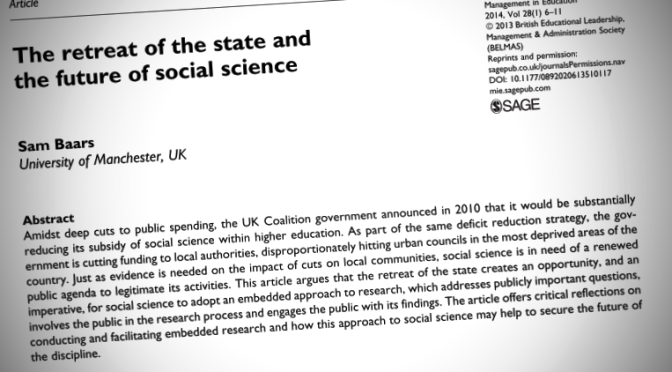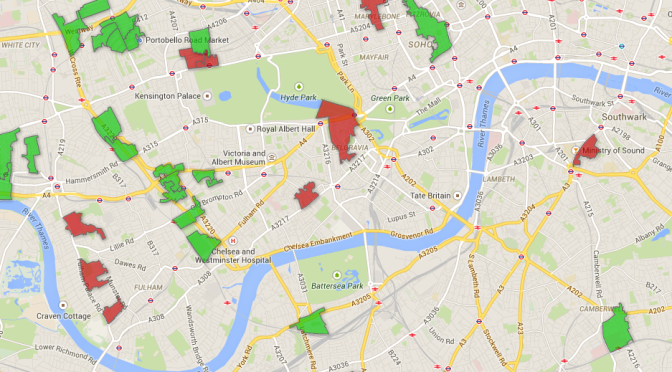-

Local government and economic development: what you need to know
In the Guardian today I discuss the main findings from my report on the levers of local economic development for the Local Government Knowledge Navigator.
-
Mapping school exclusions
5170 pupils were excluded from state-funded primary, secondary and special schools in England in 2011/12. Since peaking in 2003/4, numbers of school exclusions have been falling for the last decade, although other trends have been more persistent: the vast majority of permanently excluded pupils are boys, and Black Caribbean pupils are around three times more likely to…
-
Questioning the ‘culture of worklessness’
My spatial analysis of young people’s occupational aspirations, using data from the Understanding Society dataset, reveals a surprising result that directly questions the current policy discourse which puts forward an intergenerational ‘culture of worklessness’ as an explanation for youth unemployment. My analysis shows that even when a variety of individual- and household-level factors are accounted for (such as…
-

The retreat of the state and the future of social science
In a paper published today in Management in Education, as part of a special issue on embedded research, I argue that the government’s cuts to the social sciences within higher education, alongside those being made to local authority budgets in some of the most deprived areas of the country, present researchers with an imperative to…
-

Poor outcomes in affluent areas
Ofsted released its annual report today, and one of its key messages is that some of the poorest educational outcomes are now concentrated in more affluent outer-urban areas. Traditionally, the inner city has been the place to go if you want to find the weakest GCSE results, the highest rates of school absences and the…
-
‘Low aspirations’ – rhetoric without evidence
In a speech today on the barriers to social mobility in the UK, the Prime Minister singled out the “low aspirations” of young people from poorer families, deprived areas and ethnic minorities as a key factor in their relative lack of success in attaining the best jobs. The way to increase the social mobility of…
-
Counter-deprivational outcomes
The Index of Multiple Deprivation (IMD) is one of the core area-level measures in my research, which is looking at how young people’s occupational aspirations are shaped by the areas they live in. IMD scores are a composite of several specific deprivation ‘domains’, which separately measure a range of types of deprivation, from an area’s…
-
Mapping the housing shortfall
There’s been a lot of discussion today about the housing shortfall in the UK, and in particular whether the restrictions of the planning system or the cap on councils’ housing spending is to blame. Whatever lies behind the low present rate of house building – and there are a range of possible explanations, including the…
-
Suspended spaces
Last month I contributed a post to the cities@manchester blog which explored the ‘suspended spaces’ that exist amidst the urban bustle of Manchester city centre. During my four years living in Manchester I became increasingly interested in – and often frustrated by – the temporary car parks, abandoned buildings, stalled construction projects and boarded-up voids…
-
Priced out
Housing Benefit was introduced in 1988 as a subsidy to both social-rented and private-rented tenants as a way of increasing access to affordable housing for those on low or no incomes. HB arose in response to the shrinkage of the social housing sector caused by a reduction in new social housing construction and the sale of…